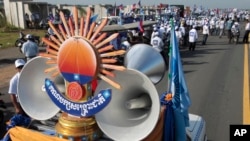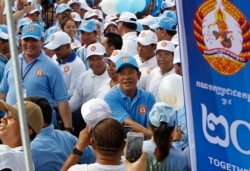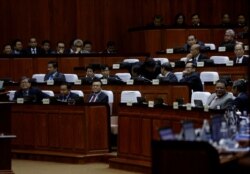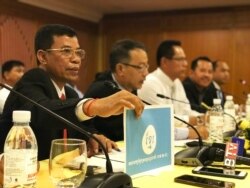Seng Mengbunrong left for Malaysia late last year, hoping to return to Cambodia with senior exiled Cambodia National Rescue Party leaders. Sam Rainsy had vowed to return to Cambodia on November 9 last year, a plan that was unsuccessful after he was blocked by the government from entering the country.
Still in Malaysia, Seng Mengbunrong reflects on his association with the CNRP, where he started as one of the many youth activists who amplified the party’s policies on Facebook in the run-up to the 2013 national election.
After the 2013 national ballot, where the CNRP won 55 seats, he was asked to join the party. Seng Mengbunrong saw it as an opportunity to build on Cambodia’s fledgling democracy and support a viable opposition to the Cambodian People’s Party’s decades-long hold on power.
“Part of me wanted to try to change the leadership [in the country], and I believed that a change in leadership isn’t a backward [step] for the country. It could move [the country] forward,” he said.
But Seng Mengbunrong’s anticipated leadership change came to an abrupt halt. In 2017, after a better-than-expected result at the commune election, the party’s president, Kem Sokha, was jailed for alleged treason. Two months later, the Supreme Court made a landmark judgment to dissolve the party and ban 118 of its senior members from political activity.
Monday marked three years since the CNRP was dissolved, with no other party, so far, able to fill the void created by the defunct political entity.
The 2017 decision also meant that the party’s 5007 elected commune officials – 489 of which were commune chief positions – were redistributed almost entirely to the ruling CPP. Then in the 2018 national elections, despite the presence of 19 other parties, Prime Minister Hun Sen’s party swept all elected seats in parliament, turning Cambodia into a de facto one-party state.
Former CNRP officials have repeatedly demanded that the party be reinstated, to remedy the political void created in its absence. The United States and European Union have also called for the party to be allowed to reform and for charges against Kem Sokha to be dropped.
Political analysts and observers say the CNRP’s ability to pose an electoral threat to the CPP was exactly why reconciliation was unlikely. Seng Mengbunrong believes that there will not be a serious non-CNRP opposition in the country for decades.
“Other [opposition] parties will need at least 20 to 30 years of struggle, and Cambodia can’t wait,” he said.
Korn Savang, a senior officer at election monitoring NGO Comfrel, said currently there were no checks and balances in parliament because the CPP occupied all the seats.
He said in the past when the CNRP and other parties were present in parliament, there would be some debate on legislation and public policy, and that opposition lawmakers would attempt to hold the government and cabinet ministers accountable.
"But now, it is no more,” Savang said. “There is no check-and-balance system and no political debate in parliament when it comes to proposing or implementing laws and policies.”
Even when CNRP lawmakers were in parliament during the last mandate, they faced a lot of obstruction from the government, and often, draft laws would be passed with little debate and with the opposition boycotting the vote.
Korn Savang said the lack of opposition was detrimental to the government because it was not getting any feedback or pushback to its governance, adding that there was “no mirror to reflect their rights or wrongs.”
In the absence of the CNRP, the CPP touted the presence of 19 other parties on the 2018 ballot as evidence that Cambodia was still a multi-party democracy. But not a single party, including established parties like Funcinpec, came close to winning a seat. The count of invalid or spoiled ballots outnumbered the votes of any other party in 2018.
The government then created a new Supreme Council for Consultations and Recommendations to accommodate the smaller parties and allow them a voice in the legislative process. But, this body, where every member was given the status of a minister, has not yielded any real substantive results.
Lao Mong Hay, a long-time political commentator, said that the CPP’s decision to get rid of the CNRP had affected Cambodian democracy and that smaller parties were merely existing at the behest of the ruling party, much like in China.
The Cambodian consultative council resembles a similar body in China called the Chinese People's Political Consultative Conference, which attempts to include a wider array of voices outside the communist party structure, and functions in an advisory role.
“[Democracy] is heading towards the dictatorship,” Lao Mong Hay said. “What the [government] is doing is to serve their own interests.”
Former CNRP Deputy President Mu Sochua said the lack of a parliamentary opposition had resulted in little attention being paid to critical social issues affecting the Cambodian populace.
She said parliament had not addressed issues like high levels of indebtedness, especially during the COVID-19 pandemic, as well as ever-present land disputes and growing concerns of a secret deal to allow Chinese military assets access to the Ream Naval Base in Preah Sihanouk province.
“In our absence, when anyone stands up as the voice of the opposition, they are imprisoned,” she said.
But, CPP Senator Sok Eysan felt concerns about the absence of a parliamentary opposition were unfounded because the CPP worked within the confines of legal and legislative procedures.
He added that the CPP’s work would be unaffected even if a minority party were to enter parliament.
“But even if there was an opposition party, they could not do anything because the CPP would have a majority,” said Sok Eysan.
A small number of former CNRP lawmakers and party officials have over the last three years requested the government for political amnesty, with at least 14 senior party members allowed to resume political activity.
While some have yet to determine their political plans, others have formed their own political parties in an attempt to unite the CNRP’s support base.
These parties are the Cambodian Nation Love Party, Khmer Conservatism Party, and Khmer Will Party, which was formed by Kang Monika who is the son of former Sam Rainsy Party stalwart Kong Korm.
Of the three parties, only the Khmer Will Party contested the 2018 election and won 3.35 percent of the national vote, despite promising pro-worker policies if elected.
Earlier this week, three non-CNRP affiliated parties – the Beehive Social Democratic Party, Khmer National United Party, and Khmer United Party –formed a coalition to contest the 2022 and 2023 elections in the hopes of consolidating their small vote bases to win National Assembly seats.
Astrid Norén-Nilsson, author of “Cambodia's Second Kingdom: Nation, Imagination, and Democracy,” said it was unlikely minor parties would be able to transfer the CNRP’s votes to themselves because the electorate was skeptical of their agenda.
She said the only chance of a viable opposition movement if former members of the CNRP decided to uniformly direct their supporters to a new political entity, much like when the Future Forward Party in Thailand, which was dissolved in February after a strong electoral performance, directed its supporters to the Move Forward Party.
“The only alternative to the CNRP I could see would be if there were to be a joint decision to reorganize in a different electoral vehicle, similar to what happened following party dissolution in Thailand,” Norén-Nilsson said.







